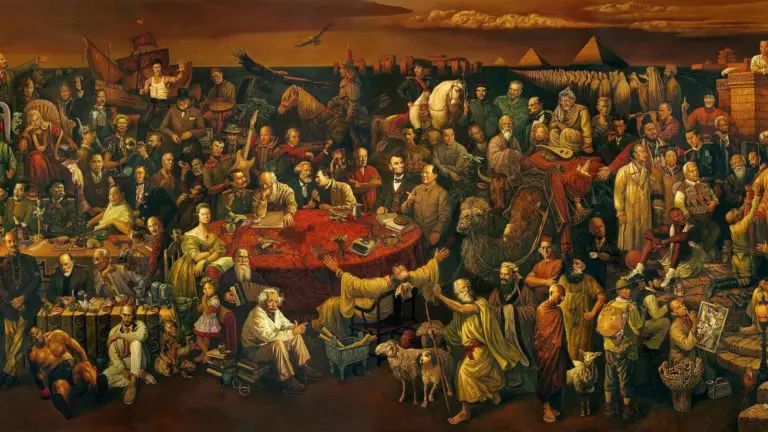One of my guilty pleasures is watching tours of luxury properties on YouTube, specifically of mansions and yachts. Modern luxury yachts especially differ very little from their landlubbing pendants. Like the homes of the rich and famous, modern yachts are an endless array of bedrooms with king-size beds, luxury bathrooms, and seating areas. Totally bereft of any character of their own, these floating shoeboxes only distinguish themselves by their size and price tag.
If we compare that to a classic sailing yacht, a very different world opens up in front of our eyes. Where modern luxury yachts are the living embodiment of boredom, classic sailing yachts, even luxurious ones, offer a glimpse of the almost primordial thrill inherent in sailing the oceans. Cabins are tight, there aren’t half a dozen seating areas, and the limitations of living on a ship are still tangible. The real magic unfolds once such a ship is plowing through the ocean, tilting and keeling, the physical effort of actually sailing the ship reminding us of the age-old human struggle with the elements of the sea, which often ended up being a struggle between life and death, the essence of which can still be felt on a sailing yacht when it brings its crew within inches of an ocean that is as mesmerizing as it can be deadly. Contrary to a modern “floating mansion,” such a ship is a celebration of a human spirit that rose to tame the waves, that found the energy and the will to create something beautiful in the face of that struggle, celebrating the ability and will of man to harness nature, while remaining a part of it.
For me, as a conservative commentator, from here on out everything should be—pardon the pun—smooth sailing, as commenting on what has been lost and what needs to be regained is conservative essay-writing 101.
Overcoming the burden of prosperity though may not be as easy and clear-cut.
The double-edged sword of prosperity
The economist Steve Keen wrote on the matter of prosperity that “empirical data shows that, at the global level, the relationship between changes in energy and changes in GDP is 1:1.” And it is true: on a global scale, billions of people have been lifted out of poverty over the past 50 years, mostly thanks to access to cheap and plentiful energy. In fact, it is this abundance of cheap energy that also helped the rise of Europe to prosperity and welfare for the masses in the late 19th and early 20th centuries, and then once again after World War II.
Whenever conservatives dream of past times in which they would have preferred to live, a variation of the caveat “…but with modern medicine” is included. Even for conservatives deeply enamored with past eras, it would be hard to accept going back to living in a time with high child mortality, rudimentary medicine, diseases, famines, lacking access to clean water, limited heating, and so on. It is the constant availability of these amenities that puts the living standard of even the poor of today in many respects above that of the kings of the past. And yet, we seem to be unable to derive much joy from it, as constantly rising rates of depression, suicide rates, and other mental illnesses seem to indicate.
For a long time, it seemed like this was a symptom of the decadence of the West, and where it appeared in other parts of the world, such as in Japan and other parts of Asia, we considered it to be a side effect of “westernization.”
But what if these aren’t symptoms specifically tied to a declining West, but instead to modernity itself? What if they are an inevitable side effect of humans having risen above the constant struggle for survival by achieving such surplus that all basic needs of life have been fulfilled? What if it was exactly this struggle to stay alive, to find fresh water, to heat the home, to overcome, was what drove mankind to not only survive, but which made us actually feel satisfied, alive, and attuned with the world we inhabited, and in turn fueled the urge to shape our surroundings with expressions of beauty that reflect this experience?
Prosperity has taken this sense of achievement from us by outsourcing the production of anything that would have been an expression of personal achievement in the past to a more efficient mass-produced item instead. Where our homes would have been reflections of our own personal past in previous times, nowadays they are mass-designed shoe boxes that strive on the contrary to be as interchangeable as possible. In an age in which our society could afford for most of us to just sit at home and consume all day long while robots and a few managers regulate the production of consumer goods, most of the mundane tasks of everyday life we are left to deal with feel like distractions to hide the vacuousness of our lives. We have become completely disconnected from the outcome of our work, merely fulfilling our societal duty as wage slaves to validate our continued existence and the consumption of financial breadcrumbs handed to us to keep the circuit of consumption going.
The sense of adventure and conquest is considered toxic in our modern society, yet they are these very concepts that would have led people to form intense attachments to their personal achievements. Just like the character of Tom Hanks in ‘Castaway’ felt the greatest sense of accomplishment when first he lit a fire by himself, so have countless generations of our ancestors relished the houses they built, the wheat they farmed, and the swords they forged. We, on the other hand, struggle understandably to derive a similar sense of achievement from writing countless emails at work in a single day, only to come home and order what millions of other people have ordered online before. And ordering a “Home sweet home” doormat just isn’t the same as carving a plaque for the entrance of your own home by yourself.
Nostalgia and artificial scarcity
Some conservatives dream of going back to a status quo from the past when these problems weren’t as prevalent. They believe it may be enough to return to the 1980s of either Ronald Reagan, Margaret Thatcher, or Helmut Kohl, while others dream of a return to the 1950s before the cultural revolution of the 1960s, and yet others wish to go back even further in time. But even if these wishes could come true, they would inevitably lead us back onto the same historical path that has brought us where we are today. Since many of the problems plaguing us nowadays have their roots centuries ago, going back to a previous historical state would at best buy us a few decades (or centuries, depending on your dreams) of time before we would inevitably encounter the same problems again.
But the concept of artificial scarcity, as the many shortages we’re experiencing these days are the result of conscious decisions leading to these very shortages, is an attempt to achieve just that. French President Macron only recently announced the “end of abundance,” making it clear that the powers that be are well aware of the situation and their almost therapeutic sense of duty to put us back into the struggle. This appeals even to some conservatives. A personal acquaintance, for instance, considered the ‘electrification of the rural populace’ a mistake, as that led to estrangement of the farmer from his work. The repackaging of Marxist terminology aside, the consequences of a deindustrialization of agriculture have to be clear: famines, poverty, and thus the death of millions of people worldwide!
Even if that was a price someone was willing to pay, the question remains whether the “age right before abundance” is a final state at which humanity should settle once and for all. Not to mention that it would take global authoritarianism, similar to the wet dreams of certain elites like those of the World Economic Forum, to realize a society in which progress beyond a certain point would be blocked.
Yet while these billionaire socialists are driven (or at least pretend to be) by a belief in a utopian society in which mankind will find fulfillment once it succumbs to global management by a select few, empirical data of similar socialist projects throughout history indicates otherwise. And still, many people buy into the various scarcity programs of recent years: scarcity of social contacts during the pandemic, scarcity of energy, scarcity of food—all these man-made scarcities are embraced by large parts of the population, possibly—and I am admittedly speculating on this—because it makes them feel alive again? This may be also why so many people are willing to sacrifice everything we built up as a society over the conflict in Ukraine and even consider launching nuclear missiles while being cheered on by their supporters for doing so without a hint of doubt. Going out with a bang, but feeling alive while doing so!
This, however, is irresponsible and self-destructive behavior. And it won’t satisfy us; if anything it may be proof that the Freudian concept of a human death drive is less bogus than many of us may be tempted to think. The challenge for not only the West but for the world in the modern age of prosperity, is to find a motivation to bother despite having reached our “age of comfort.” Wherever we look, there are apps and robots doing our work. We are freed up from certain tasks, yet find ourselves more than ever caught up in meaningless tasks, whether by wasting time ourselves, by the demands of our ruling bureaucracies, or by doing the countless “bullshit jobs” taking over society. When tasks like tending our own homes or caring for our children are only considered “chores” that ideally are handed out to others or even to robots, then the question “why bother?” becomes all the more pressing.
Having a lack of purpose, a genuine motivation, gives way to the ultimate question: Why bother living at all? Assisted suicide, the conscious choice not to reproduce, the hatred of everything that our society has built up over centuries—all these are indirect answers given to this question. They are disheartening, and I can’t help but be convinced that these are expressions of a depression caused by a deeply rooted crisis of purpose caused at least in part by the prosperity we achieved, which has bereft us in large parts of the daily struggle for survival that shaped the human experience in the past.
The necessary end of the limits to growth
It could be argued that the last major project that stretched the human imagination and made us rise above ourselves was outer space. The space race of the 1960s was the last time desire, the spirit of adventure, risk-taking, ingenuity, and many other traits culminated in a project in which a seemingly ‘toxic’ motivation (beating the other side to the moon) led to mankind making enormous technological bounds and leaps, which otherwise might have taken decades, within a few years. But the 1960s were also the time of societal changes, the last great socialist project prior to our own times, and as such it is not surprising that the last manned mission to the moon in 1972 coincided with the publication of the infamous Limits to Growth by the Club of Rome.
This publication marked a turning point from which not only many of the political movements prominent in today’s society derived, but maybe even more importantly, from which a cultural shift occurred that led us down a path of apathy and depression. On its website, the Club of Rome lauds the book for sharing “a message of hope,” which is described as “man imposing limits on himself” and achieving “a state of global equilibrium with population and production in carefully selected balance.” Just like the first few sentences of any socialist idea might sound nice to an impressionable mind, the empiric reality, however, is much harsher and fittingly resembles the realities of Western society nowadays: stagnation, listlessness, a crisis of purpose, apathy, and the end of the will to reproduce. And this is not exclusive to the West, birth rates, for instance, are well known to plummet wherever prosperity passes a certain threshold.
Just like the social engineers of the Club of Rome or the World Economic Forum misconstrue human nature by believing that the answer lies in taking a few steps back in human development, so are the conservatives that believe the world would be a better place if farmers weren’t allowed to use modern machinery. The results of even banning fertilizers can be witnessed in Sri Lanka right now and there are good reasons why farmers in Holland and many other countries have been taking to the streets for weeks to combat similar fertilizer bans in the West.
The purpose human nature needs can only be found by looking forward, by accepting new challenges. And a conservative vision of life, one that is rooted in understanding the value of tried and tested achievements of the past, is the best foundation to expand our horizons once again, to go where no man has gone before, to rekindle the spirit of making the impossible possible, while at the same time remaining rooted in what grounds us in the face of such chaos. Plus ultra may sound like the battle cry of a few reactionary history nerds, but what better motto could guide us once again out of our identity crisis? Let us not succumb to the depressive realities of utilitarianism, but let us kindle our children’s dreams of traversing the oceans of outer space like the explorers of old had crossed the seven seas, of becoming the first man to set foot on Mars, and to plant a flag depicting, like in the Spanish Coat of Arms of old, the Pillars of Hercules with the motto Plus ultra shining from a banner, signaling to the universe, but most importantly to ourselves, that we are not yet done exploring!
If anything, the fact that we have achieved prosperity and lost the necessity of immediate struggle means that we should dare, dream, and explore even further to find new boundaries, new risks, and new struggles. Only then may we again find the keys to purposeful lives and a return of the beauty that celebrates that we are still around, despite all odds. This struggle against our own saturation may be our biggest challenge yet.





